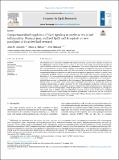Por favor, use este identificador para citar o enlazar a este item:
http://hdl.handle.net/10261/337171COMPARTIR / EXPORTAR:
 SHARE
BASE SHARE
BASE
|
|
| Visualizar otros formatos: MARC | Dublin Core | RDF | ORE | MODS | METS | DIDL | DATACITE | |

| Título: | Compartmentalized regulation of lipid signaling in oxidative stress and inflammation: Plasmalogens, oxidized lipids and ferroptosis as new paradigms of bioactive lipid research |
Autor: | Astudillo, Alma M. CSIC ORCID; Balboa, María A. CSIC ORCID; Balsinde, Jesús CSIC ORCID | Palabras clave: | Lipid mediators Phospholipid remodeling Inflammation Plasmalogens Phagocytosis Ferroptosis Phospholipase A2 |
Fecha de publicación: | ene-2023 | Editor: | Elsevier | Citación: | Progress in Lipid Research 89: 101207 (2023) | Resumen: | Perturbations in lipid homeostasis combined with conditions favoring oxidative stress constitute a hallmark of the inflammatory response. In this review we focus on the most recent results concerning lipid signaling in various oxidative stress-mediated responses and inflammation. These include phagocytosis and ferroptosis. The best characterized event, common to these responses, is the synthesis of oxygenated metabolites of arachidonic acid and other polyunsaturated fatty acids. Major developments in this area have highlighted the importance of compartmentalization of the enzymes and lipid substrates in shaping the appropriate response. In parallel, other relevant lipid metabolic pathways are also activated and, until recently, there has been a general lack of knowledge on the enzyme regulation and molecular mechanisms operating in these pathways. Specifically, data accumulated in recent years on the regulation and biological significance of plasmalogens and oxidized phospholipids have expanded our knowledge on the involvement of lipid metabolism in the progression of disease and the return to homeostasis. These recent major developments have helped to establish the concept of membrane phospholipids as cellular repositories for the compartmentalized production of bioactive lipids involved in cellular regulation. Importantly, an enzyme classically described as being involved in regulating the homeostatic turnover of phospholipids, namely the group VIA Ca2+-independent phospholipase A2 (iPLA2β), has taken center stage in oxidative stress and inflammation research owing to its key involvement in regulating metabolic and ferroptotic signals arising from membrane phospholipids. Understanding the role of iPLA2β in ferroptosis and metabolism not only broadens our knowledge of disease but also opens possible new horizons for this enzyme as a target for therapeutic intervention. | Versión del editor: | http://dx.doi.org/10.1016/j.plipres.2022.101207 | URI: | http://hdl.handle.net/10261/337171 | DOI: | 10.1016/j.plipres.2022.101207 | ISSN: | 1873-2194 | E-ISSN: | 0163-7827 |
| Aparece en las colecciones: | (IBGM) Artículos |
Ficheros en este ítem:
| Fichero | Descripción | Tamaño | Formato | |
|---|---|---|---|---|
| Compartmentalized_regulation_of_lipid_Astudillo_PV_Art2023.pdf | 887,18 kB | Adobe PDF |  Visualizar/Abrir |
CORE Recommender
Page view(s)
33
checked on 16-may-2024
Download(s)
14
checked on 16-may-2024
Google ScholarTM
Check
Altmetric
Altmetric
Este item está licenciado bajo una Licencia Creative Commons

